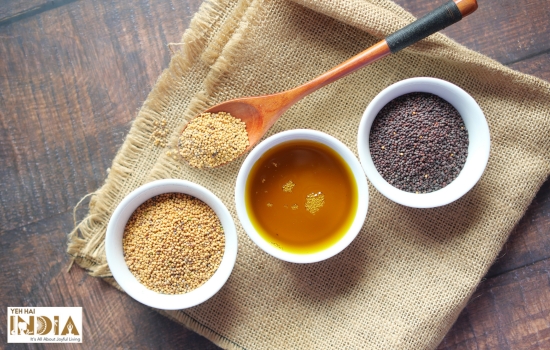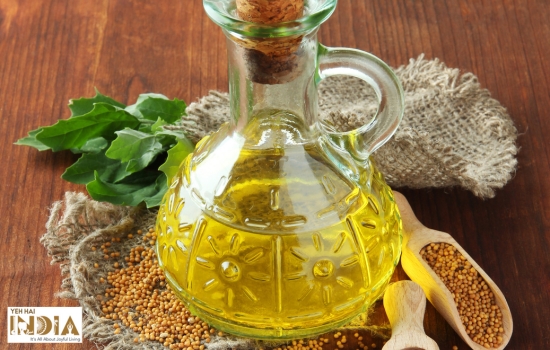While the advantages of mustard oil, often celebrated for its culinary and health benefits, have been widely recognized, it is equally essential to investigate the potential negative effects and precautions associated with its use and consumption. In this article on mustard oil side effects, we will delve into the lesser-known elements of mustard oil, shedding light on its potential negative effects and the measures that should be taken.
Mustard oil, with its unique flavour and cultural history, is a popular cooking staple worldwide. Its versatility in cooking and traditional medicine has made it a crucial ingredient in our lives, improving flavours and treating various diseases.
While mustard oil is well-known for its culinary and therapeutic applications, it is crucial to note that this powerful oil could have certain adverse effects.
By having a thorough grasp of its effects, you can make educated decisions regarding using this oil and protecting your health.
Common Side Effects of Mustard Oil

1. Skin Irritation and Allergic Reactions
Mustard oil offers numerous benefits, but its use may not suit everyone’s skin health needs.
In case of direct skin application, mustard oil may cause unfavourable reactions, such as irritation, redness, or other allergies.
Irritation of the Skin:
Mustard oil’s pungent odour may cause skin irritation, especially in sensitive areas. Applying it directly may cause burning, redness, or itchiness.
Allergic Reactions:
Mustard oil contains chemicals that can cause allergic reactions in sensitive individuals, including skin rashes, hives, swelling, and difficulty breathing. To avoid these reactions, individuals with a history of mustard seed allergy or sensitivity should avoid direct skin application or consult a healthcare expert.
Negative responses to mustard oil are more susceptible in case of pre-existing skin conditions like eczema or psoriasis.
Precautions:
To use mustard oil on the skin, perform a patch test and wait 24 hours. If no negative consequences occur, proceed cautiously.
Prioritize skin health and well-being before incorporating mustard oil into your skincare routine.
2. Digestive Distress

Mustard oil, known for its culinary and therapeutic qualities, can cause potential gastrointestinal (GI) issues, including exacerbation of symptoms and discomfort in those with acid reflux, gastritis, or ulcers.
Irritation of the stomach:
The strong taste and pungent chemicals in mustard oil can irritate the sensitive stomach lining, causing symptoms such as heartburn, indigestion, and acidity.
Bloating and flatulence:
Consumption of mustard oil can also cause bloating and flatulence, as the chemicals that give mustard oil its particular flavour and perfume contribute to excess gas in the digestive tract, causing pain.
Diarrhoea:
Diarrhoea may also occur due to the oil’s potency, causing loose stools or diarrhoea in some people.
Exacerbation of digestive problems:
The oil’s potency may cause the intestines to respond, resulting in a changed bowel movement pattern and may exacerbate symptoms of digestive problems like IBS or IBD.
Precautions:
Incorporate mustard oil gradually into your diet in case of digestive sensitivity.
Mixing mustard oil with other meals can reduce its stomach lining effect. Maintaining a healthy digestive system is crucial to be healthy.
Recommended Article: Refined Oil vs Filtered Oil – Which is Better for Your Health?
3. Respiratory Sensitivity: Mustard Oil’s Inhalation Impact
Irritation of the Respiratory System:
The strong fragrance and pungency of mustard oil can cause coughing, sneezing, and throat pain when inhaled.
Respiratory Condition Concerns:
Additionally, individuals with asthma, bronchitis, or other respiratory disorders may find that the pungent chemicals in mustard oil aggravate their symptoms, leading to respiratory distress and difficulty breathing.
Precautions:
To reduce noxious odours inhaled, ventilation in the cooking area helps. Being aware of your respiratory system’s reaction to mustard oil is crucial. Prioritising respiratory health and making educated decisions will help you enjoy the benefits of mustard oil while minimising hazards.
4. Photosensitivity as an effect of mustard oil

Mustard oil, known for its unique qualities, can increase skin sensitivity to sunlight, causing photosensitivity. This condition occurs when mustard oil contains chemicals that make the skin more sun-sensitive, potentially causing sunburn or irritation.
Sun Protection Precautions
To reduce photosensitivity risk, minimize sun exposure when using mustard oil, especially during peak hours. Wear protective clothing like long sleeves, caps, and sunglasses for extra protection.
Mustard oil offers numerous benefits, but it’s crucial to be aware of potential adverse effects like photosensitivity. To protect skin health, take basic measures and be cautious of sun exposure. If you experience unpleasant effects or increased sensitivity, consult a healthcare expert for advice. The health of your skin is worth the extra effort.
5. Cardiovascular Issues
Intense flavour of mustard oil may produce a transient increase in blood pressure. Individuals with hypertension or heart disease should use mustard oil with caution.
6. Mustard Oil and Infant Skin Sensitivity

Extra attention is needed when using mustard oil for newborn massages, as its intensity can cause skin problems.
Possibility of Skin Irritation:
Babies’ delicate skin is sensitive to mustard oil, which can cause irritation and pain. To avoid negative effects, perform a patch test on a tiny area before applying it to your baby’s skin.
If negative effects occur, switch to a milder oil. Prioritizing your child’s comfort and well-being is crucial, and consult your doctor before using mustard oil for newborn massages. They may offer advice tailored to your baby’s specific needs, ensuring a safe and happy experience for your little one.
7. Mustard Oil and Hormonal Imbalances
A more severe result of the mustard oil side effects from overconsumption is the interference with thyroid hormone levels.
Glucosinolates present in Mustard oil reduce iodine absorption, which is crucial for thyroid hormone formation. Therefore, people with pre-existing hormonal disorders should exercise caution when consuming mustard oil.
While moderate intake of mustard oil in a balanced diet is unlikely to cause significant hormonal changes.
8. Mustard Oil and Pregnancy

Mustard oil contains erucic acid, which poses health hazards in high doses, especially for pregnant women.
Consuming mustard oil in large amounts can negatively impact foetal development and pregnancy outcomes.
Pregnant women should use caution when taking mustard oil, choosing cooking oils with reduced erucic acid levels and consulting a healthcare expert for personalized dietary advice.
Restricting mustard oil intake and using safer oils during pregnancy is crucial for a healthy and safe pregnancy.
9. Rhinitis
Mustard oil’s strong odour may cause respiratory responses in individuals with rhinitis, a condition characterized by nasal channel inflammation and irritation. This can lead to symptoms like congestion, runny nose, and sneezing.
The strong odour of mustard oil may aggravate symptoms or cause pain in people who have rhinitis or other respiratory sensitivities. It’s vital to realise that everyone’s reactions are different.
If you have rhinitis or are prone to respiratory irritation, you should use mustard oil with caution. Before administering medication topically, consider completing a patch test and keeping an eye out for any adverse effects.
To Conclude,
While mustard oil offers many benefits, it’s crucial to be aware of its potential side effects to make informed choices. By understanding and mitigating these mustard oil side effects, we can continue to enjoy its merits while safeguarding our well-being.
It is crucial to pay attention to your body’s reaction to mustard oil and consult a doctor or nutritionist for personalised advice on whether mustard oil is good for your health or if other solutions are better.
Although mustard oil side effects seem to be reason enough to stop using it, it has a number of benefits which you can read here!
Recommended Article: Mustard Oil and Its Remarkable Health Benefits










